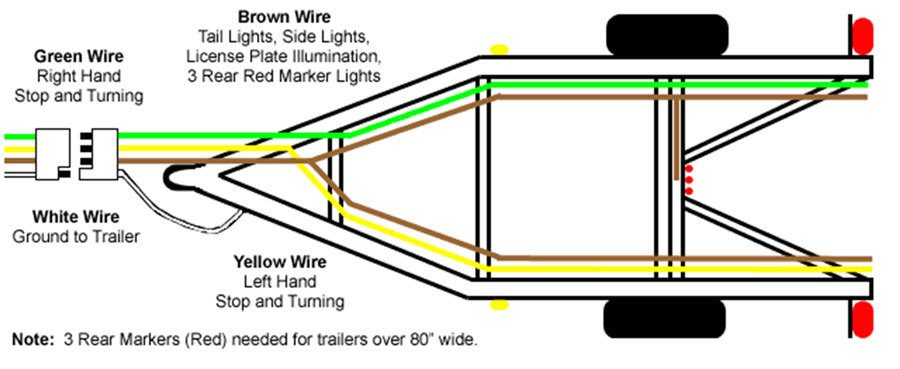
Ready to hit the open road with your trailer in tow? Before you embark on that adventure, ensuring your trailer's lighting system is properly connected is paramount for safety and legality. This brings us to the unsung hero of towing: the 4-pin flat trailer wiring harness kit. It's the vital link that powers your trailer's lights, ensuring visibility and signaling to other drivers, making your journey safer and more secure.
A 4-pin flat connector is the standard for many light-duty trailers, providing the essential connections for tail lights, turn signals, and brake lights. This seemingly simple connector plays a crucial role in keeping you and other drivers safe on the road. Without a properly functioning 4-pin wiring setup, your trailer becomes a potential hazard, especially at night or in inclement weather. This guide will unravel the intricacies of this essential component, providing you with the knowledge you need to choose, install, and maintain your 4-pin flat trailer wiring harness.
Imagine this: you're driving down a dimly lit highway at night, and the driver behind you can't see your trailer's brake lights. A potentially dangerous situation, right? A correctly installed and functioning 4-pin wiring harness is a fundamental aspect of safe trailering, preventing accidents and ensuring a smooth, worry-free towing experience. This guide is your one-stop resource for understanding everything about 4-pin flat trailer wiring, from selecting the right kit to troubleshooting common issues.
The history of trailer wiring harnesses is intertwined with the evolution of automobiles and the increasing need to haul goods and recreational vehicles. Early trailers relied on simple, often makeshift wiring solutions. As trailers became more sophisticated, so did the wiring, eventually standardizing on connectors like the 4-pin flat. This standardization has greatly improved compatibility and safety in the towing industry. The 4-pin connector remains a reliable and cost-effective solution for many common towing applications.
Understanding the color-coding of a 4-pin connector is crucial for proper installation. Brown is typically for tail lights/running lights, yellow for left turn and brake lights, green for right turn and brake lights, and white for ground. The importance of a dedicated ground wire cannot be overstated, as it ensures the electrical system functions correctly and safely. Issues with a 4-pin harness can arise from corrosion, loose connections, or damaged wires. Regular inspection and maintenance are vital to preventing these issues.
Benefits of a properly installed 4-pin flat trailer wiring harness kit include enhanced safety through proper lighting signals, compliance with traffic regulations, and ease of use due to its standardized design. For example, connecting a small utility trailer to your vehicle becomes a simple plug-and-play operation with a compatible 4-pin setup.
Advantages and Disadvantages of a 4-Pin Flat Trailer Wiring Harness Kit
| Advantages | Disadvantages |
|---|---|
| Simple and easy to install | Limited number of functions (no electric brakes or auxiliary power) |
| Cost-effective solution for basic lighting needs | More susceptible to corrosion compared to weather-sealed connectors |
| Widely available and compatible with most light-duty trailers | Not suitable for trailers with advanced lighting features |
Best Practices:
1. Always disconnect the vehicle's battery before working on the wiring.
2. Use dielectric grease on the connector to prevent corrosion.
3. Securely mount the wiring harness to prevent damage from road debris.
4. Regularly inspect the wiring for signs of wear or damage.
5. Test the lights after installation to ensure proper function.
FAQs:
1. What is a 4-pin flat trailer wiring harness kit? - A kit containing the wiring and connector needed to connect your vehicle's lighting system to your trailer.
2. How do I install a 4-pin wiring harness? - Follow the instructions included with your specific kit, as wiring may vary slightly between vehicles.
3. What if my trailer lights don't work after installation? - Double-check all connections, fuses, and ground wires.
4. Can I install a 4-pin harness myself? - Yes, with basic automotive wiring knowledge and tools.
5. Where can I buy a 4-pin flat trailer wiring harness kit? - Auto parts stores, online retailers, and RV supply stores.
6. What gauge wire is typically used in a 4-pin harness? - 16-18 gauge is common.
7. How can I prevent corrosion in the connector? - Apply dielectric grease to the terminals.
8. What if my trailer has more than four wires? - You'll likely need a different connector, such as a 5-pin, 6-pin, or 7-pin connector.
In conclusion, the 4-pin flat trailer wiring harness kit, while seemingly simple, plays a vital role in safe and responsible towing. By understanding its function, ensuring proper installation, and following best practices for maintenance, you can enjoy countless miles of trouble-free towing. Investing in a quality 4-pin wiring harness and taking the time to install it correctly is a small price to pay for the peace of mind and safety it provides on the road. Remember, proper trailer lighting is not just about following regulations; it's about protecting yourself, your passengers, and other drivers on the road. So, before your next towing adventure, take the time to ensure your 4-pin wiring is in top condition and enjoy the journey knowing you've taken a crucial step towards safer towing. Stay safe and happy travels!
Electrical panel costs unraveling the mystery of main distribution panel pricing
Unlocking color codes sherwin williams rgb conversion
Traffic incident on 275 south impacts commute













